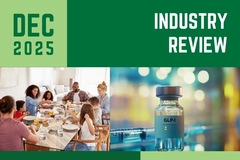
- Industry news
Industry news
Trending now
- Category news
- Reports
Trending now
- Key trends
Trending now
- Multimedia
Multimedia
Trending now
- Journal
- Events
Trending now
- Suppliers
Suppliers
Trending now
- Home
- Industry news
Industry news
Trending now
- Category news
- Reports
Trending now
- Key trends
Trending now
- Multimedia
Multimedia
Trending now
- Events
Trending now
- Suppliers
Suppliers
Trending now
Ombudsman Judges EHPM Claims Complaint Valid

EHPM, which filed the complaint in September, said that the decision was confirmation of the admissibility of the complaint that the assessment of article 13.1 claims is not in accordance with the requirements of the EU Nutrition and Health Claims Regulation.
Nov 24 2011 --- European trade association EHPM has hailed an ombudsman decision this week that a complaint it submitted against the implementation of the article 13 health claims evaluations is admissible for further investigation.
EHPM, which filed the complaint in September, said that the decision was confirmation of the admissibility of the complaint that the assessment of article 13.1 claims is not in accordance with the requirements of the EU Nutrition and Health Claims Regulation.
The organisation filed the complaint on the premise that the European Commission and the European Food Safety Authority (EFSA) had consistently ignored the regulation’s requirement for a different type of assessment for article 13.1 claims as compared to article 13.5 and article 14 claims (referring to the reduction of disease risk and children’s development and health).
Instead, the same type of assessment has been used for both types of claims, which EHPM believes compromises the regulation’s intended proportionality and undermines its aims of achieving a high level of consumer protection, increased legal security for food companies, fair competition and the promotion and protection of innovation.
“We are pleased that the ombudsman has judged our complaint to be acceptable under the terms of his remit and are now waiting for the results of the investigation to confirm our view that there is an integral problem with the claims evaluation process,” said EHPM Chairman Peter van Doorn. “We hope that this process will clarify the need for the application of a different type of assessment. We hope the outcome of this investigation will confirm that the article 13 claims evaluation should include an assessment of the totality of the evidence, the provision of clear indications on the extent or degree to which the food-health relationship is substantiated rather than the current yes/no opinions, and will lead to the use of accepted scientific methodologies for assessing strength, consistency and plausibility of the evidence.”
The complaint will now undergo a full investigation by the ombudsman. On completion, the ombudsman will give its decisions and recommendations.
“We have worked with the European Commission to ensure an appropriate interpretation of the regulation and this has lead to a number of welcomed changes in the implementation,” said Mr van Doorn. “It has not, however, resulted in a fundamental reappraisal of the assessment process that is directly responsible for the rejection of more than 95 percent of the claims for other substances. We believe this reappraisal is essential to provide scientifically justified information to consumers and maintain the potential for innovation. If not, the outcome of the process is expected to be seriously detrimental. The Ombudsman has been installed precisely to help find solutions in such cases and we hope that through this mediation we can reach a compromise agreeable to all parties.”











